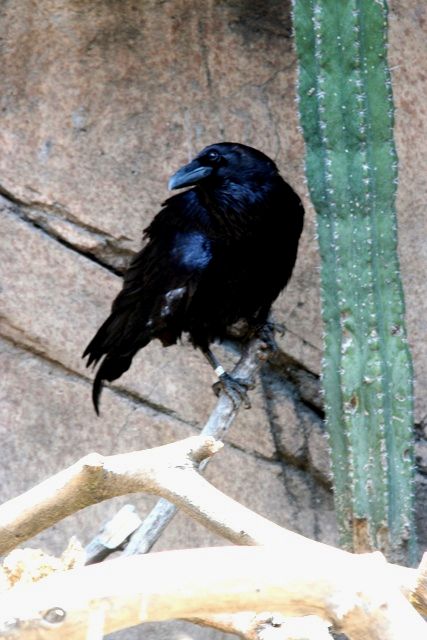|
RAVEN >> Ignorance
 Associated with the owl, as an inhabitant of waste places, is the raven; under which term, no doubt, are included all birds of the raven family. Perhaps it will never be a settled question whether our crows and their kindred rooks do more good as insect and carrion eaters, or harm by devouring little birds and pulling up the corn. If regarded as helpers, they are very blundering and indiscriminate helpers; if as enemies, they are clumsy, not malignant, and not very harmful. The raven proper is a much larger bird, now scarce in our country except in the forests. Mr. Tristram says of him: Associated with the owl, as an inhabitant of waste places, is the raven; under which term, no doubt, are included all birds of the raven family. Perhaps it will never be a settled question whether our crows and their kindred rooks do more good as insect and carrion eaters, or harm by devouring little birds and pulling up the corn. If regarded as helpers, they are very blundering and indiscriminate helpers; if as enemies, they are clumsy, not malignant, and not very harmful. The raven proper is a much larger bird, now scarce in our country except in the forests. Mr. Tristram says of him:
The carnivorous propensities of the raven, and especially its habit of attacking weak or sickly animals, and of always commencing by picking out their eyes, is alluded to in Proverbs 30:17:
“The eye that mocketh at his father, and despiseth to obey his mother, the ravens of the valley shall pick it out.” We have more than once seen the ravens thus attack a newly dropped kid. (Natural History of the Bible)
Mr. Wood adds:
Like all feeders on carrion, it is wonderfully quick in detecting a dead or dying animal, and rivals the vulture itself in the sharpness of its vision. If anyone who is passing over a part of the country where ravens still survive should wish to see one of the birds, he has only to lie flat on the ground, and keep his eyes nearly shut, so as only to see through the lashes. Should there be a raven within many miles, it is sure to discover the apparently dead body, and to alight at no great distance, walking round and round, with its peculiar sidelong gait, and, if it be not checked in time, will make a dash at the eye of the prostrate individual, and probably blind him for life. This habit of pecking at the eye is inherent in all the crow tribe. (Bible Animals)
With little beauty in their blue-black coats and no music in their voices, they present to us images of those who are ignorant and superstitious, not knowing very clearly the difference between good and evil, but loving to think and chatter about spiritual things from appearances, seeing in them signs and omens. The Scandinavians called the raven “the bird of Odin”; the ancient Greeks also drew auguries from his doings, supposed to reveal his intuitions of future events. Swedenborg says they signify “natural men, who, concerning divine truths, are in darkest lumen from fallacies, in which have been many of the gentiles” (Apocalypse Explained #650).
In the Scriptures, the raven stands sometimes for those who hold tenaciously to the falsities of ignorance, and sometimes simply for the densely ignorant gentiles, who yet are cared for by God, and may afterwards be instructed. In the former sense, it is said that when the waters of the flood began to subside, Noah “sent forth a raven, which went forth to and fro until the waters were dried up from off the earth” (Genesis 8:7); signifying that after the falsities which destroyed the most ancient Church began to diminish, the fallacies of ignorance still caused confusion.1 In the same sense it is said of Edom, “The owl also and the raven shall dwell in it” (Isaiah 34:11).
In the better sense, it is related that when Elijah fled from Ahab, “he went and dwelt by the brook Cherith, that is before Jordan. And the ravens brought him bread and flesh in the morning, and bread and flesh in the evening; and he drank of the brook” (1 Kings 17:5, 6). By Elijah is represented the literal precepts of the Word; his persecution by Ahab represents the hatred of those precepts by those who are in the evil delights of self-love; and his maintenance, under the providence of the Lord, by the ravens, represents the preservation of such precepts by those who were in simple gentile ignorance. In the passage, “He giveth to the beast his food, and to the young ravens which cry” (Psalm 147:9), they are meant who are in fallacies of ignorance, and desire instruction. Again, the Lord says, “Consider the ravens; for they neither sow nor reap; which neither have storehouse nor barn; and God feedeth them” (Luke 12:24). The ravens are here put for the “fowls of the heavens,” which signify affections for thinking truth, which do not labor for the production of it, neither lay it up. Of these the ravens represent the most ignorant. Yet even for them provision is made by the Lord of some knowledge of religion and morality, by traditions and derivations from others, by which a capacity for heaven may be formed in them. ( Arcana Coelestia #864)
Author: JOHN WORCESTER 1875
|
|